Richard Branson’s words of wisdom for QR code food tech trailblazer Mr Yum
Mr Yum chief executive Kim Teo’s Necker Island sojourn in May with Richard Branson proved to be a turning point for the food ordering tech firm, and has inspired her plans to start a family.
Several times a year the magnificent Necker Island, nestled in the British Virgin Islands in an unspoilt region of the Caribbean, is home to intimate leadership gatherings run by the charitable foundation of the island’s world famous owner, Richard Branson.
For four days in mid May this year, Necker’s breathtaking views of crystal clear water surrounded by picturesque landscapes played host to entrepreneur Kim Teo and her partner of the past five years, Adrian Osman.
They are known in the business world as two of the four founders of trailblazing Melbourne-based QR code menu ordering platform Mr Yum. Kim is CEO.
The moment Kim was greeted by Branson at the Virgin Unite leadership gathering attended by tech entrepreneurs and venture capitalists from all over the world, she vowed to turn off her laptop and phone for the duration of her stay.
After battling through two bouts of Covid, she wanted to savour the Necker experience. As it turned out, she could do anything but.
“It felt like that was the week that the sky almost fell out of the earth as the market completely went into a system of shock,’’ she now says of the sharemarket rout of technology stocks that suddenly moved into the private markets in the second week of May.
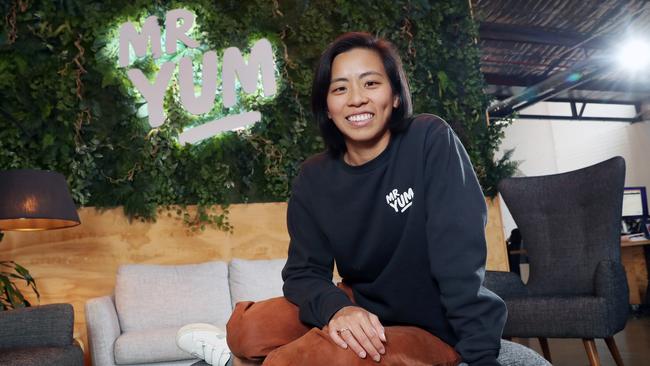
On her first day at Necker, famed tech incubator Y Combinator, which invested in global accommodation behemoth Airbnb more than a decade ago, sent out a chilling, 10-point survival strategy to its founder network.
It warned that the market correction had closed the doors to fresh venture capital funding rounds and put countless tech companies globally in the toughest position they had ever faced.
“In the space of an hour I received it from five different people. It was so doom and gloom, they were not constructive points they were making. It was basically conserve cash, fix the business or die,” Kim says.
“It was the straw that broke the camel’s back in the VC industry. In the space of 24 hours it created a hurricane of doom and gloom.”
Secretive hedge fund and venture-capital fund Tiger Global, a backer of Mr Yum since December, has become a poster child of the tech meltdown for incurring one of the largest-ever losses by a hedge fund this year.
But, after growing rapidly during the Covid pandemic by offering restaurants, cafes and pubs a way to deal with customers during lockdowns with QR code-based menus, Mr Yum was one of the lucky tech firms that locked its money away from firms like Tiger when they were seemingly giving it away late last year.
Mr Yum’s $US65m funding round finalised in December — Australia’s third-largest Series A — also attracted investment from Skip Capital founder Kim Jackson and her husband, Atlassian co-founder Scott Farquhar, Kogan chief Ruslan Kogan, basketball star Patty Mills, musician Rufus Du Sol and even Tennis Australia.
Importantly the round included follow-on investments from AirTree Capital and Steve Baxter’s TEN13 fund.
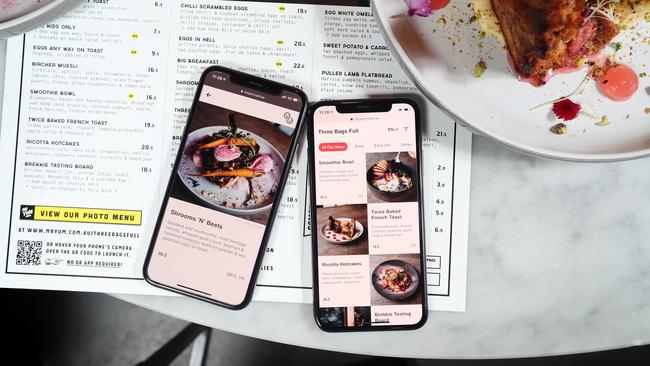
While Kim says many tech firms that raised money in the past year now had a hefty valuation to live up to, Mr Yum was lucky that it didn’t take the highest number on offer; in fact, it settled on one 40 per cent lower.
She also has confidence that firms like Mr Yum that have recently raised Series A or B rounds still have up to five years before they consider a move into the public markets, giving plenty of time for tech valuations to recover.
But she reveals the events that occurred during her Necker Island stay have led to a re-evaluation of the Mr Yum business plan.
On the trip back to Melbourne from the Caribbean, she and Adrian drafted an email to their staff, many of whom have never known a recession and were oblivious to the gyrations of the sharemarket.
The first part presented a dummies’ guide to the things that normally happen in recessions, while the remainder documented what it would mean for the start-up industry and then, finally, for Mr Yum.
At the end of May they presented to staff the firm’s cash position and runway. Then the management and staff came up with up to nine different initiatives to reduce costs and increase revenue.
Kim claims Mr Yum still has the majority of its $US65m funding round in the bank, bar what it spent in early May on the acquisition of customer relationship platform MyGuestList and communication tool Sprout.
The round was the largest ever for a female-led company in Australia and, interestingly, she believes the current tough period ahead will be better managed by female tech executives than males.
In the past two years of heady tech valuations, she claims only 3 per cent of new funding went to female-led businesses as “male egos took over”.
“I think while females are not as good at talking about their businesses, they are a lot more conservative on expectations around valuation. They spend more sensibly and they run more capital-efficient businesses,” she says.
“So I think that these current conditions are going to be really helpful for women getting investment.”
DELEGATION, FAMILY PLANS AND BUILDING A GENERATIONAL COMPANY
Kim still wonders why over the four days she spent at Necker Island, Richard Branson made a point of sitting next to her at dinner on two occasions.
“Maybe one day I will learn why. He kept talking to me about delegation. Finding and trusting the right people and letting them have the autonomy while having the support behind them if needed,” she says.
“He also taught me a lot about the mistakes that he made in delegation across his Virgin Group of companies. Sometimes you get it wrong.”
Perhaps Branson overheard the conversations Kim had with some of the attendees at Necker — which included Square Peg principal Paul Bassat — about the next stage in the evolution of Mr Yum.
It will see her and Adrian start a family, when they will confront the challenge of building the business while being parents. They plan to marry in April next year.
“I’m 35 and Adrian is 30, which is lucky, but 35 is a kind of intimidating age for a female,” she says. “We’ve just gone through the process of freezing embryos because we’re trying to have an insurance policy on kids.
“As much as it will be a great job, if we want to build a generational company, it is going to happen alongside kids. There’s no other way that will work,” she says bluntly.
“35 is like the age where your fertility really starts to change. As a female, the sooner you can get the eggs fertilised with the sperm to make embryos, kind of younger the better.”
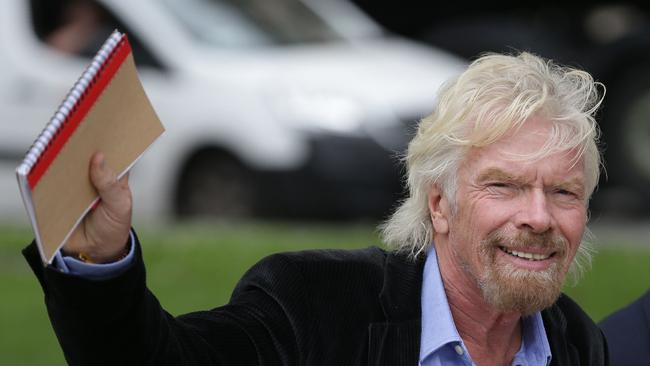
They don’t want to be trying to conceive naturally when she is 37 or older, which she asserts is “kind of late in life”.
The Mr Yum team is aware of the founder’s baby plans, but some are already getting in first. A number of directors and their partners are due to have children for the first time in the next three months.
The change will provide new challenges for not only Kim and Adrian but their co-founders, Kerry Osborn and Andrei Miulescu. Kim, Adrian and Kerry started their first business eight years ago, before the former two were dating.
Kim has previously said she had a “girl crush” on Kerry at the time and now believes she could not have built Mr Yum without her.
She says having four founders involved in the business full-time works because of their geographic split. Andrei is based in Melbourne and Kerry in Los Angeles — where there are now 15 Mr Yum staff — while she and Adrian spend their time outside Melbourne developing the UK market.
“We respect each other and run sessions between the four of us giving each other feedback, although we don’t do them often enough. Adrian runs them. We have a period of self reflection and then the others do feedback for you,” Kim says.
“The negative stuff is pretty much always aligned. Where your co-founders can help you is with tactics to be better at something you aren’t good at.”
In April last year when they started the UK business — which now has 40 people — Kim, Adrian and their three initial staff members lived and worked in a five-bedroom house in up-market Kensington, where Kim says the beds, especially the pillows, left a lot to be desired.
She says the key to the success of their personal and business relationship is to never draw a line between them.
“Life is life. We meet so many people through work, like founders, partners and team members that end up becoming really good friends of ours. They kind of level up into one. We don’t try to split things up,” she says.
Going forward, she hopes the strong growth of Mr Yum in the UK and the consolidated state of that market compared to Australia will see it generate up to 25 per cent of group revenues by the end of the first quarter next year.
But Australia will still remain the firm’s strong base platform.
’I WAS CRYING … IT FELT LIKE A BREAK-UP’
Kim will never forget making an emotional phone call last year to an American woman whose name she wants to keep anonymous, but who she describes as a partner of one of the top-10 venture capital firms in the world.
The firm wanted to cover 80 per cent of Mr Yum’s Series A raising but at a lower valuation to those being offered by rivals. Kim desperately wanted her on the Mr Yum board (where she is still the only female).
But she and her fellow founders knew they had to protect their shareholders in the business from dilution. They said no.
“I cried on this call. She was crying and I was crying. It felt like a break-up, a love story that had transpired over a short period of time,” she says.
While she retains a good relationship with the woman and will see her in San Francisco later this year, she says the experience highlighted what a “jam packed, emotional process” raising capital can be.
It also reminded her of her humble roots. Yet here she was holding conversations with some of the most powerful people in venture capital on the planet.
Born in Singapore, Kim came to Australia with her siblings when she was 10 years old. Her older brother had long struggled with the hierarchical, regimented nature of Singaporean life and vehemently resisted learning Mandarin, a necessity for students in the Island state.
Their small-business-owner parents decided to give their children a different opportunity in life and the family settled in Perth.
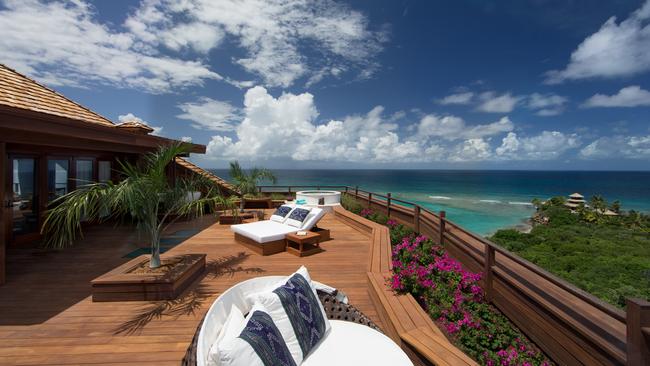
Kim worked in a graduate job at JP Morgan before quitting 11 months into a two-year program to pursue her entrepreneurial dreams. Fast forward nine years and she was appointed Mr Yum chief executive in 2018.
“I was a kid that probably could have stayed in Asia. I was academic and good at all the things they wanted me to be good at. But I don’t think I would have been nearly as adaptable if I did. I’ve lived in Melbourne, Sydney and Brisbane and now in London and the US,” she says.
“I think that level of having to pick up and move wherever, and know that it’ll take a bit of time to settle in, and understand that you get a bit homesick, and managing your expectations for what it’s like learning a new city or giving yourself a chance to love it, I think it’s something that I was taught very young and it still helps me today.”
She is now looking forward to the next stage in the evolution of Mr Yum. On its new path, in the past eight weeks she believes the firm — from a “company effectiveness point of view” — has achieved more than in the past eight months.
It has thrived on what she calls the “Oh shit moments”. Like in Covid, with only $600,000 in the bank, when it was presented with a once-in-a-lifetime opportunity to be focused and creative.
Or more recently, in the months following her unforgettable Necker Island sojourn when, as she puts it, the firm has “slowed down to speed up again”.
“The thing that I care about is we want to build a generational company,” she says.
“I think, in these moments, the companies that survive and thrive are the ones that will end up doing that.”



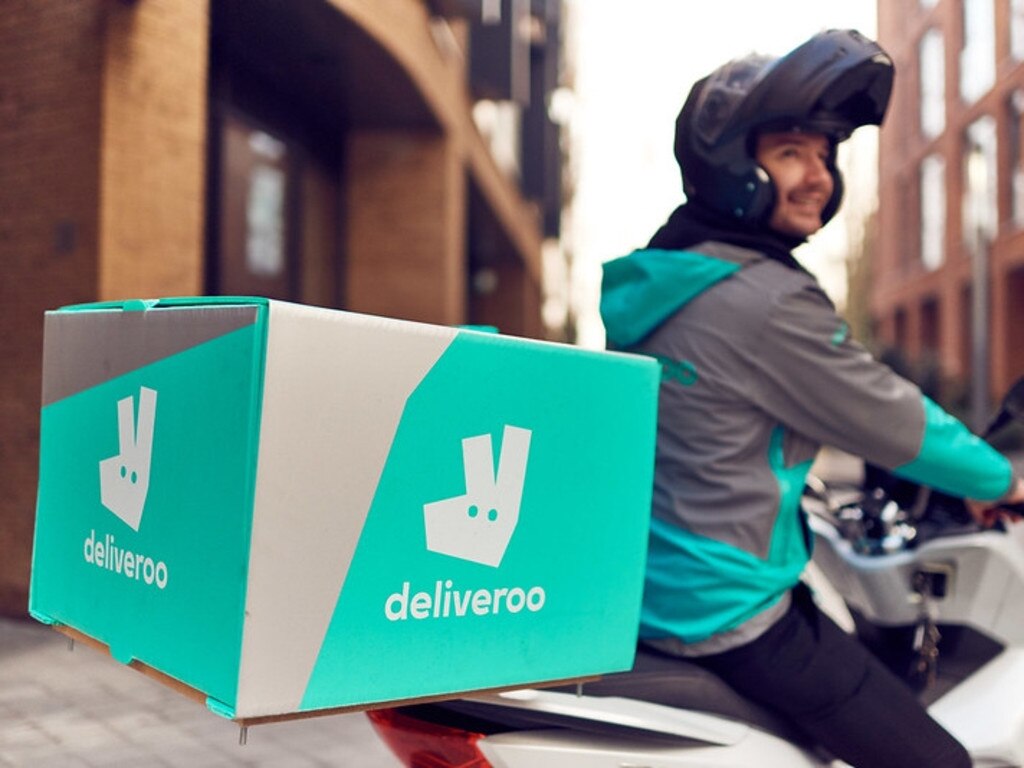



To join the conversation, please log in. Don't have an account? Register
Join the conversation, you are commenting as Logout